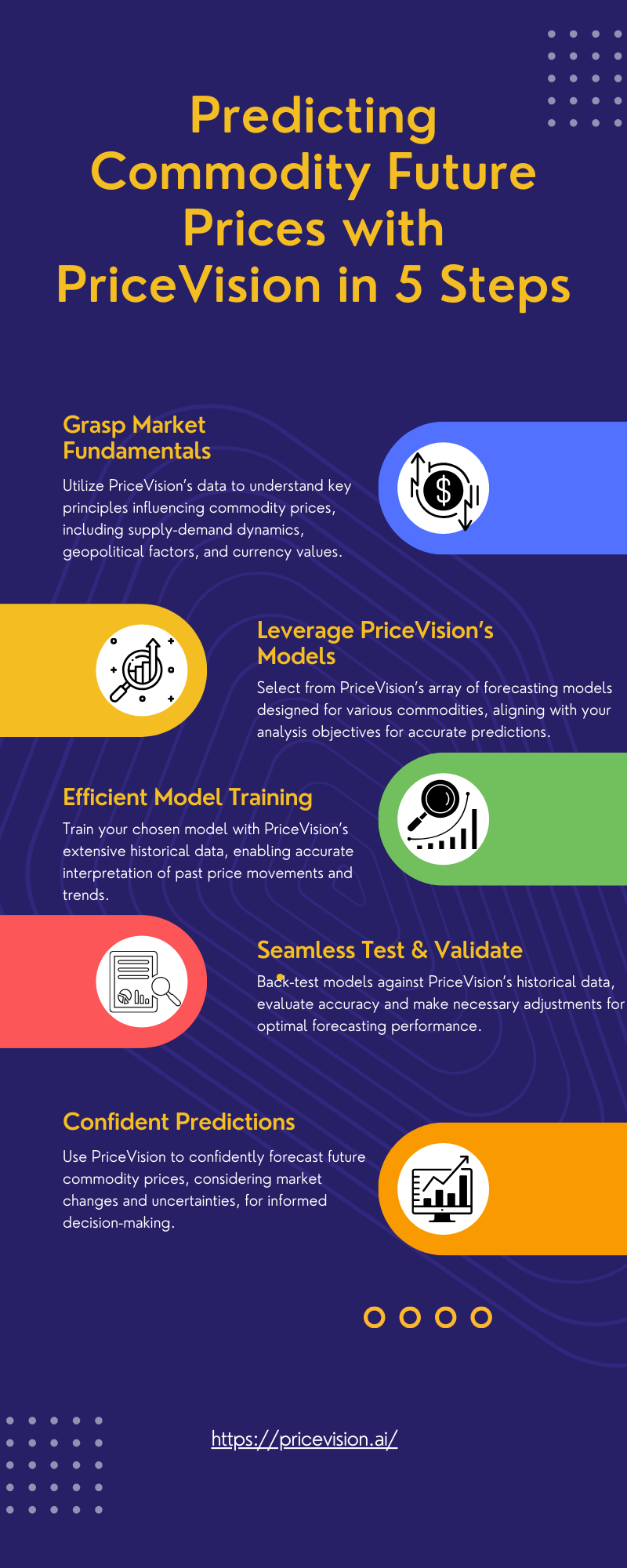Commodity price forecasting is a skill that opens the doors to informed decision-making in the world of finance. In this comprehensive guide, we’ll delve into the art of predicting the future price movements of commodities. By the end of this article, you’ll be armed with the knowledge and insights to forecast commodity prices like a pro.
What is Commodity Price Forecasting?
Commodity price forecasting is the process of predicting the future price movements of raw materials or primary agricultural products, known as commodities. These commodities can include anything from precious metals like gold and silver to essential resources like oil, gas, and agricultural products such as wheat or coffee.
This forecasting technique involves using various methods, tools, and analyses to make educated estimates about how commodity prices are likely to change over time. The goal is to provide traders, investors, and businesses with valuable insights into the direction these prices may take.
Commodity price forecasting is vital because it enables market participants to make informed decisions. Traders can time their buying and selling activities, while investors can better allocate their resources. It also helps businesses manage their supply chains and production costs, ultimately impacting profitability.
Understanding the basics of commodity price forecasting is the first step toward becoming proficient in this critical field of finance. It involves analyzing historical data, assessing supply and demand dynamics, and employing techniques such as technical and fundamental analysis to make well-informed predictions about the future movements of commodity prices.
The Significance of Commodity Price Forecasting
Why is commodity price forecasting so important, and how does it impact various industries and individuals? Let’s explore its significance:
Ensuring Profitability
Commodity price forecasting is not just a crystal ball gazing exercise. It plays a vital role in ensuring profitability for traders and businesses. By predicting price movements, traders can make strategic decisions that maximize their returns and minimize potential losses.
Risk Mitigation
Price volatility is a common feature in the world of commodities. Commodity price forecasting helps mitigate risks associated with these price fluctuations. When you can anticipate market movements, you’re better prepared to adapt to changes.
Informed Investment
Investors heavily rely on commodity price forecasts to make well-informed decisions. Whether you’re considering buying gold or investing in agricultural commodities, knowing the likely price trends is essential for a successful investment strategy.
Economic Insights
Commodity prices often act as barometers of economic health. When these prices rise or fall, they can signal broader economic trends. Therefore, the ability to forecast commodity prices is a valuable economic indicator.
Mastering Commodity Price Forecasting
Unlocking the secrets of commodity price forecasting requires a combination of knowledge, techniques, and tools. Let’s explore the key elements that will set you on the path to becoming a pro in this field.
Historical Data Analysis
To understand where commodity prices are heading, it’s essential to look back. Analyzing historical data provides valuable insights into past price trends. By identifying patterns and trends, you can make more accurate predictions about future price movements.
Supply and Demand Dynamics
Commodity prices are intricately linked to supply and demand dynamics. Changes in production, geopolitical events, and shifts in consumer behavior can have a significant impact on prices. Staying informed about these factors is crucial for effective forecasting.
Technical Analysis
Technical analysis is a powerful tool for traders. It involves studying price charts, indicators, and trends to predict future price movements. It’s like reading the language of the market, and when done skillfully, it can be a game-changer for your forecasting accuracy.
Fundamental Analysis
Fundamental analysis looks beyond price charts and delves into the underlying factors that influence commodity prices. Economic indicators, government policies, and global events all play a role in shaping prices. Being well-versed in these aspects is essential for a comprehensive understanding of commodity markets.
Expert Insights
In the world of commodity price forecasting, expert advice is priceless. Following financial news, seeking guidance from experienced traders, and participating in forums can provide you with valuable insights and perspectives on commodity markets.
Tools and Software
Embracing technology can significantly enhance your forecasting capabilities. Specialized software and tools designed for commodity price forecasting offer real-time data and analysis, making it easier to stay updated with market changes.
Staying Ahead in Commodity Price Forecasting
The world of finance is dynamic, and commodity markets are no exception. To stay ahead in commodity price forecasting, it’s essential to keep your knowledge current. Here are some strategies to help you continuously improve your forecasting skills:
Embrace Technological Advancements
The world of finance is becoming increasingly digitized. Stay updated with the latest technologies and tools available for commodity price forecasting. These tools can provide real-time data, advanced analysis, and automation that can give you an edge in the market.
Continuous Learning
The financial world is always evolving, and staying informed about the latest trends and global events is crucial. Read financial news, follow industry experts on social media, and consider online courses to deepen your knowledge.
Backtesting
A valuable strategy is backtesting your forecasts. This involves applying your forecasting methods to historical data to assess their accuracy. By doing so, you can refine your approach and identify areas for improvement.
Diversify Your Knowledge
Don’t limit yourself to a single approach. Consider a combination of technical and fundamental analysis. Diversify your knowledge to gain a more comprehensive understanding of commodity markets.
Risk Management
A successful commodity price forecaster is not just about predicting prices; it’s also about managing risk effectively. Implement risk management strategies to protect your investments.
Conclusion
In conclusion, the ability to forecast commodity prices like a pro can be a game-changer in your financial journey. Whether you’re a trader or an investor, making informed decisions is essential for success. Commodity price forecasting empowers you to anticipate market movements, mitigate risks, and seize opportunities.
Remember, it’s a journey of continuous learning and adaptation. Embrace the latest technologies, stay informed, and diversify your knowledge. By doing so, you can confidently navigate the dynamic world of commodity markets.



